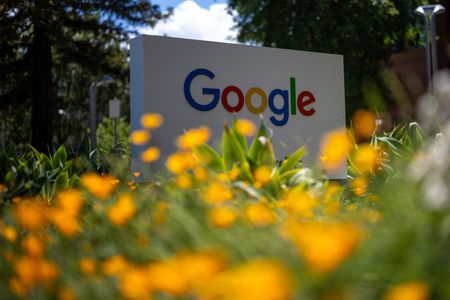By Kenrick Cai, Jeffrey Dastin, Greg Bensinger
MOUNTAIN VIEW, California (Reuters) -Alphabet’s Google said on Tuesday it would put artificial intelligence into the hands of more Web surfers while teasing a $249.99-a-month subscription for its AI power users, its latest effort to fend off growing competition from startups like OpenAI.
Google unveiled the plans at its annual I/O conference in Mountain View, California, which has adopted a tone of increased urgency since the rise of generative AI challenged the tech company’s longtime stronghold of organizing and retrieving information on the internet.
In recent months, Google has become more aggressive in asserting it has caught up to competitors after appearing flat-footed upon the release of Microsoft-backed OpenAI’s ChatGPT.
Alphabet CEO Sundar Pichai said at the conference: “Over and over, we’ve been able to deliver the best models at the most effective price point.”
Its AI assistant Gemini app now has more than 400 million monthly active users, Pichai said.
In a major update, the company said consumers across the United States now can switch Google Search into “AI Mode.” Showcased in March as an experiment open to test users, the feature dispenses with the Web’s standard fare in favor of computer-generated answers for complicated queries.
Google also announced an “AI Ultra Plan,” which for $249.99 monthly provides users with higher limits on AI and early access to experimental tools like Project Mariner, an internet browser extension that can automate keystrokes and mouse clicks, and Deep Think, a version of its top-shelf Gemini model that is more capable of reasoning through complex tasks.
The price is comparable to $200 monthly plans from AI model developers OpenAI and Anthropic, underscoring how companies are exploring ways to pay for the exorbitant costs of AI development. Google’s new plan also includes 30 terabytes of cloud storage and an ad-free YouTube subscription.
Google already offers other subscription options, including a $19.99-per-month service with access to some AI capabilities unavailable for most free users and cheaper plans with additional cloud storage. Last week, the company told Reuters it had signed up more than 150 million subscribers across those plans.
At the same time, with consumer use of AI chatbots showing signs of stickiness, investors will be tracking the degree to which Google is aggressive in disrupting its search advertising business line, which accounted for the majority of the company’s $350 billion in 2024 revenue.
Pichai told reporters that the rise of generative AI was not at the full expense of online search.
This “feels very far from a zero-sum moment,” said Pichai. “The kind of use cases we are serving in search is dramatically expanding” because of AI.
Alphabet shares were down 1.3% at $165.73 on Tuesday afternoon.
SEARCH PRESSURES
Earlier this month, Alphabet stock lost $150 billion in market value in one day after an Apple executive testified during one of Google’s antitrust cases that AI offerings had caused a decline in searches on Apple’s Safari Web browser for the first time.
In turn, some analysts reassessed how to measure Google’s dominant search market share, which has for years hovered around 90% by traditional metrics.
A Bernstein analyst note this month placed the figure at 65% to 70% when accounting for use of AI chatbots. Wells Fargo analysts estimated that Google’s market share could fall to less than 50% in five years.
The analysts cited a behavioral shift drawing consumers toward AI chatbots where they once used traditional search engines.
Google is experimenting with ways to incorporate ads into its AI-powered search features. It began inserting ads into AI Overviews last May, though it has avoided any radical changes that would rock the boat.
By allowing users to answer more complex questions, AI could enable “new opportunities to create hyper-relevant, useful advertising,” Robby Stein, an executive on the search team, said in an interview.
Google’s market position could be further rocked by the outcome of legal challenges, in particular a pair of antitrust cases brought by the Justice Department, which is seeking the forced sale of parts of the tech giant including its Chrome browser.
Investment in AI accounts for most of Alphabet’s $75 billion in forecasted capital expenditures this year, a dramatic uptick from the $52.5 billion in 2024 spending that the company reported. In April, Pichai reiterated those spending plans despite market uncertainty around tariffs.
Google has injected more AI into its core search engine over the past two years, primarily through AI Overviews, generative AI summaries that are increasingly appearing atop the traditional hyperlinks to relevant webpages, and AI Mode, an experimental version that leverages AI more intensively to answer complex queries.
Tuesday’s announcements also included further updates to Google’s effort to deliver to users a “universal AI agent,” which can perform functions on someone’s behalf without additional prompting.
Google demoed an update to Project Astra, a prototype tool first teased last year that can talk to users about anything captured on their smartphone camera in real time, showing its ability to analyze a PDF document and pull information from a YouTube video to help a consumer repair a bicycle.
Executives at the conference said some features from Astra are coming to its apps.
Pichai announced other advancements showcasing AI, including personalized replies in Gmail and an update to the company’s Google Meet video conferencing software that would translate meetings between English and Spanish in real time.
Pichai also showcased Google Beam, hardware that makes video chats feel like they are taking place in person, in partnership with HP and based on Google’s Project Starline.
(Reporting by Kenrick Cai, Jeffrey Dastin and Greg Bensinger in Mountain View, California; Additional reporting by Juby Babu in Mexico City; Editing by Sam Holmes and Matthew Lewis)










